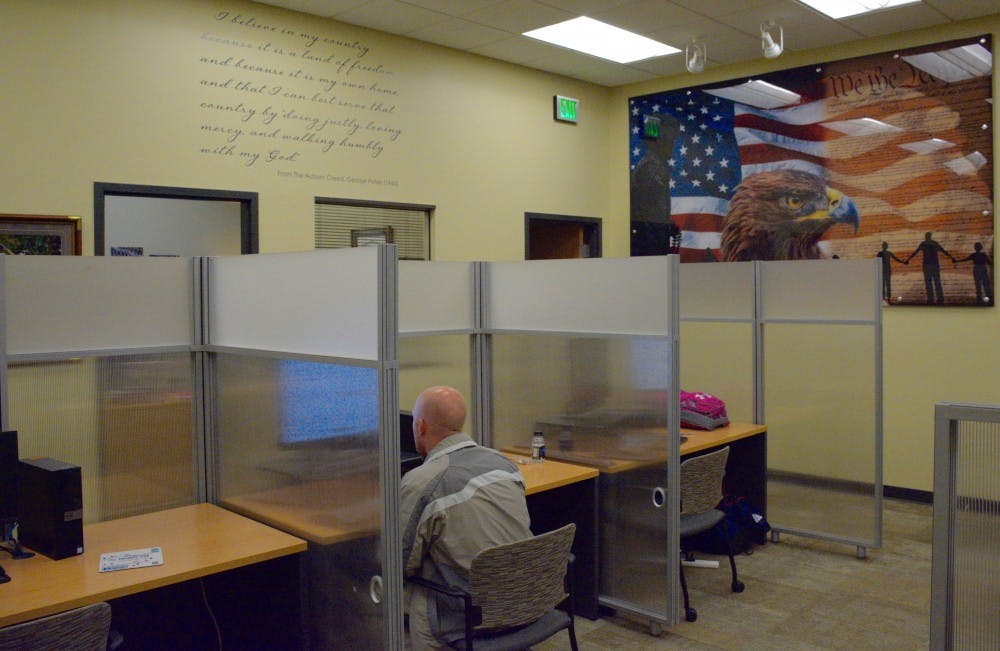The Veterans Resource Center is looking to inform the faculty and student body about how to better approach student veterans through the introduction of a new training course.
The program, Green Zone, seeks to provide “a deeper understanding and appreciation of the student veteran and military affiliated experience” to traditional, non-military students and faculty, according to a statement provided by the Veterans Resource Center.
“With so many students coming in [because of] the post-9/11 influx from the G.I. Bill, it brought a lot of students who were straight out of the military back into higher education,” said Kyle Venable, coordinator for veterans programs on campus and the former president of the Auburn Student Veterans Association. “That assimilation had never happened before in such large numbers, and a lot of universities didn’t know how to deal with military personnel coming in, especially straight from a war zone.”
Mental health education and relevant programs are becoming more normalized and available in university settings, but Venable said they’re not often staffed with faculty who have experience with the military.
Some veterans return from combat or their stations with conditions like traumatic brain injuries or post-traumatic stress disorder and find themselves unable to relate to others who study or work at school.
“[With Green Zone], we want to let faculty and staff know of some of the things military-affiliated students have gone through, like deployments or TBIs,” he said. “A lot of times, if you tell somebody you’re a veteran, the first thing they think is you were in combat.”
In this sense, Venable said he hopes the program will clear up misconceptions those unfamiliar with military life may have.
The name Green Zone comes from a designated safe area during the War in Afghanistan.
“When [the U.S.] was bombing Baghdad and took over, the parallel and perpendicular lines around Baghdad were cordoned off, and that’s what made a safe zone for all the U.M. and U.S. forces,” Venable said.
Dates are still being determined for faculty trainings, but the program will also expand to the student body in the spring semester.
The Auburn Student Veterans Association will assist in its growth, said Benjamin Barrontine, the organization’s president and senior in industrial engineering and Spanish.
“Right now, we have a great relationship with SGA, Student Affairs and Student Involvement,” Barrontine said. “We are going to try to mimic the bigger organizations such as SGA and the Greek councils on how they market and promote themselves.”
Barrontine said the essence of the program will involve the main staff of veteran programs, such as Venable, giving their background in service.
Barrontine will discuss the transition from the armed forces to higher education and take questions from participants as a representative for student veterans.
Events leading into Green Zone’s launch for students will include a “meet a vet” open forum in which student veterans will share their stories to attendees, Barrontine said.
Venable developed the program for Auburn in part because of a run-in during a class with a professor.
“We were talking about rules of engagement in combat in this ethics class,” he said. “He knew I was a veteran because I wore these shirts. He kinda called me out in class and asked a question, so I gave my piece and told him what I thought, then he fired back at me with some questions that really made me feel uncomfortable.”
The Veterans Resource Center is in talks with the University Medical Clinic to have specialists hired who would address student veterans’ mental health, and Barrontine hopes Green Zone will aid in the project’s progress.
“Essentially to use your VA benefits, you have to go to a VA hospital, and that’s about an hour drive,” he said. “For a lot of student veterans, that’s just not feasible. We’re working to establish something on campus that’s readily available.”
Green Zone will be similar to other trainings on campus in that labels will be created and sent out to faculty who have completed the course and are Green Zone-certified.
“As a veteran, I want to walk into somebody’s office knowing, ‘OK, they know a little bit about VA, they know about benefits,’” Venable said. “I know I can go in there and say a couple terms, so that’ll give a bit of familiarity and put [veterans] at ease when they come into that environment.”
Barrontine said ASVA wants to see the advisors and some faculty of every college on campus having taken part in Green Zone training by the end of next semester.
“Over the summer, when it’s a little bit less hectic, we can start pushing it out to the different organizations and to the actual classrooms,” he said.
Do you like this story? The Plainsman doesn't accept money from tuition or student fees, and we don't charge a subscription fee. But you can donate to support The Plainsman.





